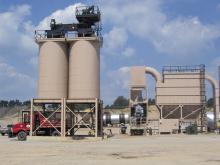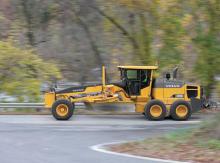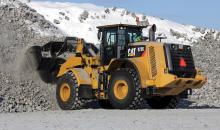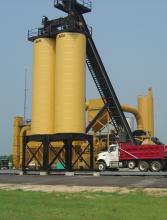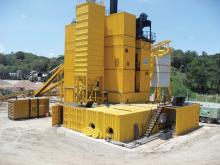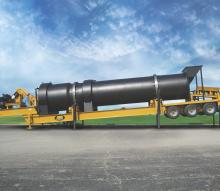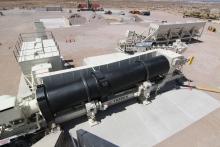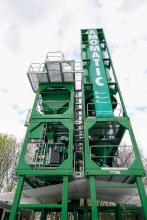A wide variety of new equipment and technology to assist production at asphalt plants is about to be launched onto the market, while asphalt producers are continuing to look at greener working practices. Guy Woodford reports
Lintec, in partnership with Loesche, recently created what they say is the world's first containerised Coal Mill Plant for independent coal dust supply at the jobsite which offers mobility and high economic efficiency through the substitution of gas or oil with coal.
The mobile co
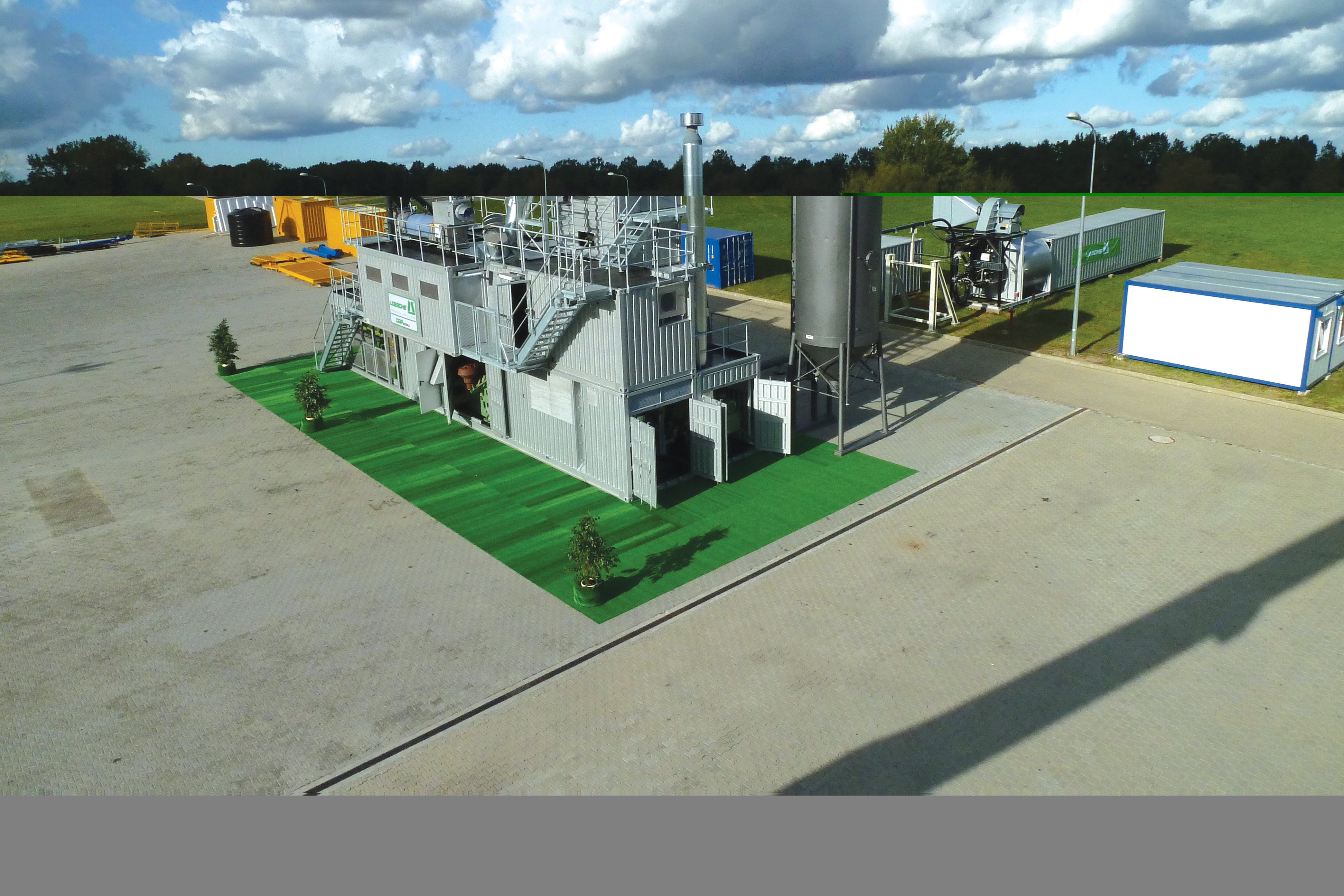
Lintec's mobile coal grinding plant in Jasien, north central Poland.
A wide variety of new equipment and technology to assist production at asphalt plants is about to be launched onto the market, while asphalt producers are continuing to look at greener working practices. Guy Woodford reports
The mobile coal grinding plant in Jasien, north central Poland can process different types of coal under almost all environmental and physical conditions and make it available to a downstream thermal process.
The innovative mobile coal grinding plant can feed around five asphalt plants with an estimated total output of 2million tonnes of asphalt a year.
Features of the plant include the capability to grind all types of coal, from brown coal to anthracite, a grain feed size of 5-30mm, a fineness size range of coal dust 5% R 90µm to 45% R µm, production of 2-4tonnes/hour coal dust, and emission values corresponding to TA air German regulations.
The plant also has explosion protection according to ATEX (optional NEC), and is installed in ISO containers. Additionally, the plant can be used worldwide at wide ranging environmental temperatures of -30°C to +40°C
"We are proud of this joint development and will continue to work together in the future" said Carsten Weiss, general manager of Germany-based Lintec, about the coal mill plant developed with Loesche.
"Both companies can look back on a long tradition with many developments. Since 1919, Lintec is one of the leading specialists in asphalt and concrete mixing plants and related equipment. This provides a perfect mix of tradition and technology." New cost-effective and efficient systems for boosting asphalt plant productivity will always attract attention, which was why expectations were high before this month's World of Asphalt 2012 and co-located AGG1 Aggregates Forum & Expo in the United States.
More than 300 exhibitors were due to showcase their equipment and IT at the threeday event in Charlotte, North Carolina, from March 13-15.
US-based
Astec was also launching at World of Asphalt 2012 (WoA) its new Data Acquisition System Hub, or DASH, said by the company to provide a real-time snapshot of operations
DASH collects data from multiple plants and makes it accessible via a web browser, or flash compatible devices such as Android tablets and smartphones. DASH, according to Astec, enables trends to be highlighted rapidly throughout an operation in order for plant management to make more effective decisions. DASH is compatible with Astec control systems TCII, PMII and PMIII.
Meanwhile fellow US-based firm,
The firm's self-erect models have a capacity ranging from 30-75tonnes, while stationary silo models hold between 100-300tonnes of asphalt mix. Each model is equipped with alarms to alert operators when asphalt levels are high, and their fiberglass blanket insulation provides enhanced heat retention while the mixture is stored. To ensure asphalt remains at a required temperature, optional oil or electric heating systems are available. Each silo has a heavyduty steel design and the barrel is continuously double-welded at the seams. It steeply tapers to a 76.2cm discharge opening where a pneumatic batcher with a dual clamshell gate is said by ADM to significantly reduce product segregation and coning.
Self-erect silos are conveyed on a gooseneck trailer with a fifth-wheel kingpin hitch. A trailer with a quad-axle and air ride suspension is a feature of the larger units. Small and midsized trailers use leaf spring suspension and either a tandem or tri-axle
According to ADM, the unit's design allows the silo and conveyor to fold into the upright position quickly and easily. Skid resistant maintenance platform, top perimeter guardrail and solid-steel toe-stop kickplate are safety features on all models. All silos can be equipped with low material signal alarms and LC1000 loadout computers, which work in conjunction with truck scales, weight batchers or reverse (negative) weigh systems.
The LC1000 enables operators to access a wide variety of information such as truck loading data, job files and silo inventory
The demand on asphalt producers to cut the ever-increasing cost of energy means that equipment producers have to offer multipurpose units.
Warm mix asphalts, gaining rapidly in popularity, offer big decreases in the amount of energy required to produce them, and modern plants are or can be equipped to make such mixes.
Remaining in the United States,
Both air force base plants were equipped with TR's warm mix asphalt system. Launched three years ago, TR says the system continues to be one of the most efficient and costeffective methods for lowering asphalt production temperatures by up to 32°C.
Designed to integrate with most input signals from a variety of plant control packages, the system can be installed on virtually any other manufacturer's asphalt plant in addition to Terex plants.
Last year, TR added an auto-fill tank with high/low level gauges to its warm mix asphalt system. Once water inside the 1,136litre tank reaches a prescribed low point, the plant controls automatically turn on water flow to refill the tank, so the plant can continue to make warm mix asphalt without stopping. A high level marker shuts off the flow of water to avoid overfilling. The system's water meter includes a 'no flow' indicator to alert the plant operator of water flow restrictions when making warm mix.
The tank's design features a solenoid valve at the water inlet to allow for water recirculation. Offered for asphalt operations that take advantage of producing warm mix asphalt in colder temperatures, this allows the plant operator to recirculate water through the tank and supply hoses, so the water does not freeze.
TR says its warm mix asphalt allows producers to take advantage of benefits associated with reducing mix temperatures, including lower fumes and emissions, reduced energy consumption and reduced oxidative hardening of the binder. TR claim that a mere 70°F mix-temperature reduction, the system can lower BTU consumption by nearly 15%. The
Unveiling "the fruit of its investments" in developing and optimising the range of Top Tower plants, it also gives details of its Compact continuous mix asphalt plant.
The Top Tower 3000 (up to 200tonnes/ hour) and Top Tower 4000 (up to 280-300tonnes/hour) plants are being joined by the Top Tower 3000 P, which like all plants in the range can integrate the most recent technological developments in recycling solutions and also for warm-mix asphalt production.
To ensure the 240tonnes/hour production rate it was decided to use the drying-filtering tower of the Top Tower 4000 plant (this consists of an upgraded 940m² bag filter and a 10m long dryer drum with a diameter of 2.5m equipped with a 19MW burner and a recycling ring capable of achieving a recycling rate of up to 35%).
"The main innovation on the plant concerns the upper part of the mixing tower and the screen in particular," says Fayat
"Our R & D Office sought to upgrade the screen and maximise the screening area (38m² of total screening capacity and 6.6m² for the sand screen), while keeping the dimensions down to a minimum." Entrance hatches on the hot-mix elevator side have been integrated into the bypass compartment for direct access to the springs responsible for keeping the meshes constantly taut, and the aggregate and filler weighing hoppers have been redesigned and enlarged, mainly in response to the requirements of customers producing special asphalt mixes containing high levels of filler.
In order to optimise the flexibility of the operating site, two types of configurations for under-mixer asphalt storage silos are proposed: a single loading line, ideal for positioning a truck weighbridge under the mix storage facility; or to position the storage silos on several loading lines, allowing several trucks to be positioned under different compartments and thus speed up asphalt loading operations. Turning to its Compact plant, Fayat says that continuous mix asphalt plants represent 50% of the fleet in France.
"Many of them need to be changed, and also modernised. Production standards, especially European ones, are changing contractors' requirements. At the same time, the Grenelle de l'Environnement [French environmental programme] is a system change moving towards more recycled material and less temperature in production. Manufacturers need to offer a product that is both new, and in line (compatible with the existing eet)," says Fayat.
The aims are the creation of a plant for the continuous multi-purpose production of cold, warm and hot-mix asphalts, with the possibility recycling up to 50% (depending on the formula used). The theoretical recycling rate increases for warm-mix asphalt.
Being multi-purpose, the Compact can be - tted with any system (foam, solid and/or liquid additives) as well as the Aquablack warm-mix system now being marketed by Fayat
Ammann is this year launching its innovative UniBatch range of mixing plants which, the company says, are made for modularity, energy ef- ciency and reduced emissions. Compatible with all types of the Swiss - rm's recycling technology, the UniBatch range is suitable for enclosing in housing The modules are suitable for transporting on standard vehicles due to standardised container dimensions which, in turn, enables short delivery times and quick assembly on site. The exible asphalt mixing plant is able to produce 80 to 350tonnes of asphalt per hour, mix 1.3 to 4.3tonnes, and has hot silo storage of 45 to 120tonnes. Operated by Ammann's as1 plant control system, the range has a mixed material storage silo of up to 450tonnes.
The as1 system is, according to
Being unveiled this April at
EcoView calculates and displays the energy consumption, energy cost and CO2 emission for every tonne of asphalt produced. A further bene-fit is the software's ability to compare current plant operation consumption with speci- ed or experience-based consumption from previous periods. This feature enables trends to be highlighted along with any necessary need for action.
Also due to be launched at Intermat 2012 is Ammann's Ammapax silencer. Said by the company to be a simple and cost-effective solution for all mixing plant operators whose plants are located near residential areas and need to conform to noise survey or regulatory approval requirements, Ammapax is available in 10dB, 15dB, and 20dB designs. The silencer is not said to require any additional installation space as it is lowered into the chimney from the top and - xed to the chimney opening. It is described by Ammann as easy to install due to its four fixing bolts
Installation in third party plants is said to be possible and very quick and simple.
In February, Italian - rm
Bernardi Impianti says the asphalt plants will be manufactured by Speedcrafts' employees using Bernardi technology and design specification.


